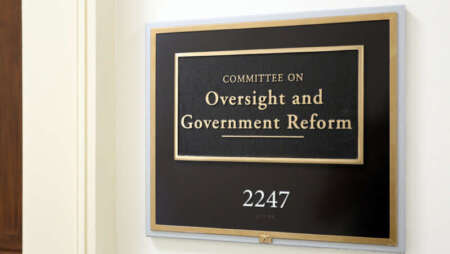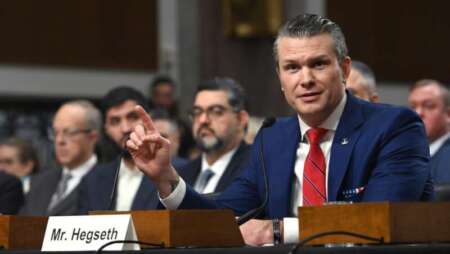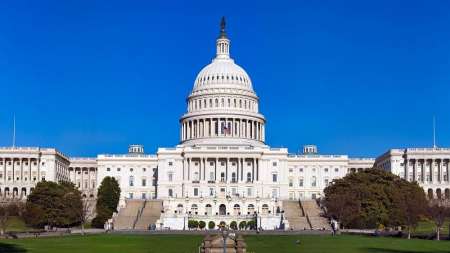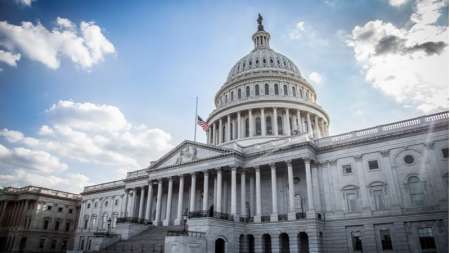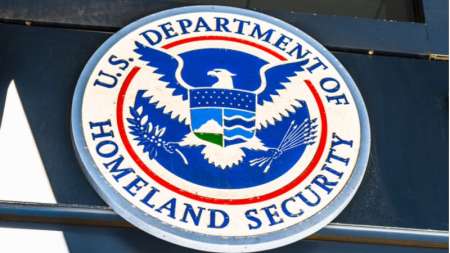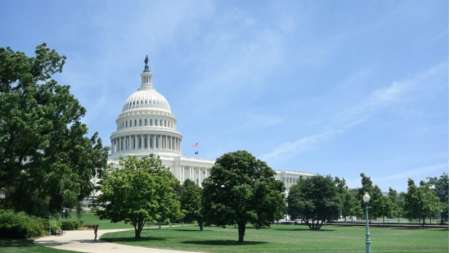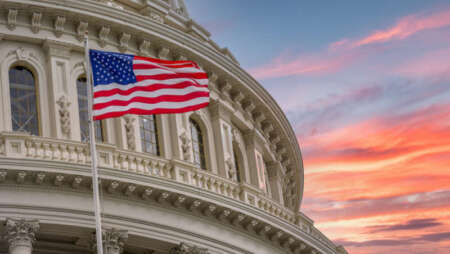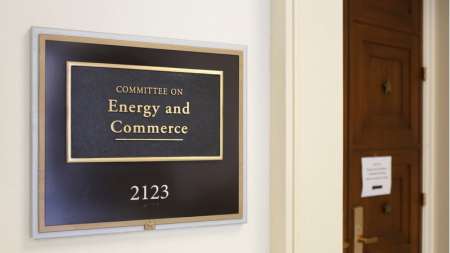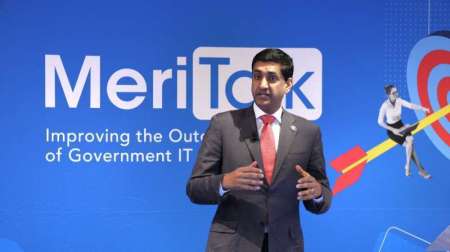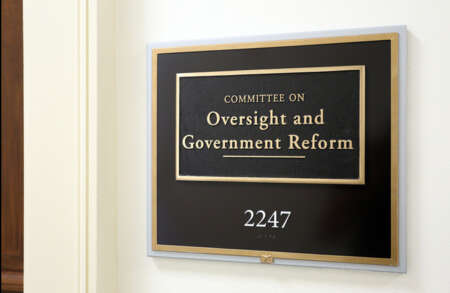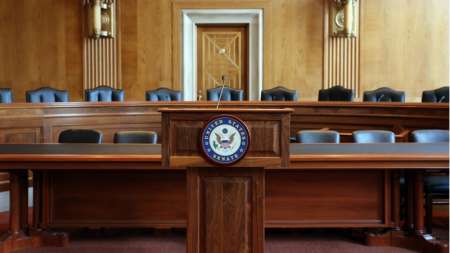Legislation that would grant President Donald Trump the authority to reorganize the Federal government passed out of the House Oversight and Reform Committee on Tuesday and is now headed to a full House vote. […]
Democratic leaders on the House Oversight and Reform Committee are launching their own investigation into the use of the Signal communications app by high-ranking Trump administration officials and are putting those officials on notice to preserve a long list of records that may be requested as part of the committee’s work. […]
Members of the House Oversight and Reform Committee clashed during a lengthy markup session on Tuesday over several pieces of legislation, including bills that would expand the Trump administration’s ability to reorganize the Federal government and terminate collective bargaining agreements. […]
Federal inspectors general (IG) – who serve as agency watchdogs – saved $71.1 billion in cost efficiency improvements in fiscal year (FY) 2024, according to a March 19 report from the Council of the Inspectors General on Integrity and Efficiency (CIGIE). […]
Senate Democrats are asking officials at the IRS for details after the agency denied access to private taxpayer information following requests from the Department of Homeland Security (DHS) and the Department of Government Efficiency (DOGE). […]
House Homeland Security Chairman Mark Green, R-Tenn., is pressing the Cybersecurity and Infrastructure Security Agency (CISA) for answers on the government’s efforts taken to address cyber threats emanating from China, and demanding proof of action as concerns mount over Beijing-linked hackers infiltrating U.S. infrastructure and networks. […]
Two prominent House Democrats said today they are using a Freedom of Information Act (FOIA) request in their continuing battle to drill down into how the White House’s Department of Government Efficiency’s (DOGE) is operating across Federal government agencies. […]
Rep. Andrew Garbarino, R-N.Y., chairman of the House Homeland Security Subcommittee on Cybersecurity and Infrastructure Protection, is urging the Department of Homeland Security (DHS) to examine the structure of the agency’s Cyber Safety Review Board (CSRB) as it considers reconstituting the board, with an eye to increasing transparency of how its members are selected and which cybersecurity incidents the board chooses to investigate. […]
The House voted on Monday to approve legislation that would integrate artificial intelligence tech and nanotechnology into U.S. border security operations. […]
Two Senate committees voted on Wednesday afternoon to advance the nominations of Dan Bishop to serve as the deputy director of the Office of Management and Budget (OMB), and Paul Lawrence to serve as the deputy secretary of the Department of Veterans Affairs (VA). […]
U.S. military leaders from across the service branches told lawmakers at a Senate Armed Services subcommittee hearing today that budget uncertainties are hindering their efforts to maintain military readiness. […]
Deploying artificial intelligence tools and improving agency data management and sharing could work to prevent fraudulent and improper payments made by the Federal government but reaching that goal also requires better agency accountability measures, witnesses told members of the House Oversight and Reform Committee’s Subcommittee on Government Operations on March 11. […]
House Republicans unveiled a spending bill on Saturday that would fund Federal agencies through Sept. 30, setting up a vote on the bill to avoid a government shutdown. The six-month funding bill largely tracks with fiscal year 2024 spending levels, with some notable exceptions that impact technology and cybersecurity. […]
House Oversight and Reform Committee Democrats are looking to find out more about top White House advisor Elon Musk and his potential conflicts of interest while guiding the Department of Government Efficiency’s (DOGE) actions to root out what the Trump administration has called widespread government waste and corruption. […]
The Senate Health, Education, Labor, and Pensions Committee voted 12-11 along party lines today to approve President Donald Trump’s pick for deputy secretary of the Department of Labor. […]
Members of the House Education and Workforce Subcommittee on Higher Education and Workforce Development met Wednesday to discuss updating the Workforce Innovation and Opportunity Act (WIOA) to include digital literacy training, AI implementations, and improved data management. […]
Members of the House Homeland Security Committee fielded recommendations on March 4 from witnesses on how to combat online radicalization – including one national security expert who said Congress should consider creating regulations of social media platforms. […]
The House Committee on Energy and Commerce advanced several cybersecurity and technology bills during a Tuesday afternoon markup, sending the legislation to the full House for further consideration. […]
A House subcommittee heard testimonies this afternoon on challenges faced by U.S. air traffic control (ATC) systems and operators while evaluating risks posed to aviation safety by recent Federal layoffs. […]
A group of Democratic lawmakers joined members of the American Federation of Government Employees (AFGE) and community activists on Tuesday in rallying to evict Elon Musk and the Department of Government Efficiency (DOGE) from the Office of Personnel Management (OPM). […]
Telehealth coverage under Medicare is set to expire at the end of this month, but a new bill from Rep. Ro Khanna, D-Calif., aims to make telehealth coverage permanent for senior citizens. […]
The House voted on March 3 to approve a bill requiring the Office of Management and Budget (OMB) and the Department of Defense (DoD) to take steps to prevent cybersecurity vulnerabilities posed by Federal contractors. […]
Rep. Jay Obernolte, R-Calif., who co-chaired the prior Congress’s House AI Task Force, said on Wednesday that he is “really optimistic” about Congress’s ability to pass substantial AI legislation and plans to reintroduce the Creating Resources for Every American To Experiment with AI Act (CREATE AI Act). […]
The inaugural hearing of the Senate Banking, Housing, and Urban Affairs Committee’s panel on digital assets took a stab at legislation that would regulate the crypto market while prioritizing the stability of stablecoin and consumer protection. […]
Democratic members of the House Homeland Security Committee said today they are pulling their support for legislation that aims to build the cybersecurity workforce, citing their opposition to widespread Federal employee layoffs being instituted by the Trump administration. […]
Members of the House Oversight and Reform Committee clashed on Tuesday over the impacts of the Trump administration’s Department of Government Efficiency (DOGE), mounting Federal worker firings, and defense spending levels, with one Republican member predicting that the current turmoil at Federal agencies may be the “tip of the iceberg.” […]
While the Trump administration plans to reshuffle funding priorities at the Defense Department (DoD) and eliminate “unnecessary” programs, President Trump’s nominee for the Pentagon’s second-highest civilian position, Steve Feinberg, assured lawmakers today that advancing autonomous capabilities would remain a top priority if he is confirmed – suggesting that the agency’s Replicator initiative may be continuing on a safer funding track. […]
House Oversight and Reform Committee Ranking Member Gerry Connolly, D-Va., demanded today in a letter to the Office of Personnel Management (OPM) that OPM rescind its memo issued earlier this month that redesignated Federal agency chief information officer (CIO) positions. […]
Rep. Anna Paulina Luna, R-Fla., chair of the Task Force on the Declassification of Federal Secrets, and Rep. James Comer, R-Ky., chairman of the House Oversight and Reform Committee, have sent several letters to national intelligence officials seeking an update on efforts to declassify documents related to unidentified anomalous phenomena (UAP), more commonly known as UFOs. […]
Lawmakers on Capitol Hill are considering expanding a ban on preventing all foreign-born nationals from adversarial nations from working in the Department of Energy’s (DoE) 17 national labs, citing risks of espionage. […]

